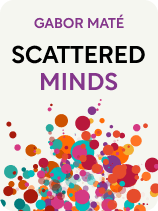

This article is an excerpt from the Shortform book guide to "Scattered Minds" by Gabor Maté. Shortform has the world's best summaries and analyses of books you should be reading.
Like this article? Sign up for a free trial here.
How can childhood experiences cause ADHD? Can ADHD be managed without medication? How can parents help children who suffer from ADHD?
In Scattered Minds, Gabor Maté argues that ADHD isn’t just a biological disorder. ADHD also is a psychological disorder that can’t just be solved with medication.
Read below for a brief Scattered Minds book overview.
Scattered Minds by Gabor Maté
In his 1999 book Scattered Minds, Gabor Maté argues that if you have ADHD, it’s because early childhood stress prevented you from developing the emotional-cognitive capacities you need to thrive in our world. Further, since ADHD isn’t just a biological disorder but one with social and psychological roots, he argues that medication isn’t the best or only way to treat your ADHD. Based on this perspective, he prescribes non-pharmaceutical treatments for both adults and children with ADHD and explains how society can prevent ADHD in future generations.
Maté is an internationally renowned family doctor with expertise in childhood development and the impacts of trauma on health. He has professional and personal experience with ADHD: As a doctor, he treats patients with ADHD, and he and his children have ADHD diagnoses themselves.
Part 1: Understanding Your ADHD Brain
Maté says that ADHD, which stands for Attention-Deficit Hyperactivity Disorder, is a neurodevelopmental condition—if you have ADHD, it’s because your brain didn’t develop typically and now works differently than other brains.
In this section, we’ll help you understand your ADHD brain more fully. First, we’ll explore what it feels like to have ADHD. Then, we’ll explain why Maté says you have an ADHD brain and discuss the brain differences that contribute to ADHD symptoms.
What It Feels Like to Have ADHD
Maté explains that if you have ADHD, you experience at least two of three primary symptoms: difficulty with attention, difficulty with impulse control, and difficulty with stillness. You may also struggle with secondary symptoms, including difficulty with self-esteem and difficulty with relationships.
Why You Have an ADHD Brain
Recall that according to Maté, you experience ADHD symptoms because your brain developed atypically. Now, we’ll explain why your brain developed atypically. First, we’ll discuss Maté’s biopsychosocial approach to the origins of ADHD. Then, we’ll discuss how biological and social factors lead to the psychological symptoms associated with ADHD.
The Biopsychosocial Approach to ADHD
Maté says that when he wrote this book, most experts believed that ADHD had exclusively biological origins—you’d only develop ADHD if you inherited the genes responsible for it. He argues that ADHD actually has biological, psychological, and social causes, and provides two justifications for a biopsychosocial approach to ADHD.
Maté’s first argument for why ADHD can’t be purely genetic is that genes are merely blueprints that tell your body how to organize itself. How your body expresses a given genetic trait as you grow up depends on environmental factors—the circumstances you live in.
Maté also argues that when interpreted correctly, research supports the view that ADHD isn’t exclusively biological in origin. Studies show that if you’re related to someone with ADHD, you’re more likely to have ADHD yourself—this is often taken to suggest that ADHD has a significant biological basis, but Maté says relatives often also share the same environments, and your environment can have an equally significant impact on your psychological development.
The Role of Genetics in ADHD
Maté says that the genetic basis of ADHD is a sensitive temperament, which predisposes you to ADHD by making you more susceptible to environmental stress. If you inherited a sensitive temperament, you’re biologically primed to readily pick up on and have more intense reactions to physical and emotional stimuli.
According to Maté, sensitivity can be advantageous—since you’re more attuned to the world around you, you take notice of the world’s most subtle complexities, and you’re given to feelings like awe, wonder, and appreciation. With those strengths under your belt, you could fill an important creative or spiritual role in society.
But sensitivity can also be disadvantageous because it makes you more likely to be negatively affected by your environment. For example, Maté cites studies that say people with ADHD are more likely to have allergies, lower pain tolerance, and higher emotional reactivity—their responses to both positive and negative emotions are just more extreme. If you’re more susceptible to environmental stress, you’re more likely to suffer the negative effects of stress—including the harmful impacts it can have on your developing brain.
The Role of Childhood Stress in ADHD
Based on anecdotal evidence from his life and the lives of his patients, Maté believes that the psychosocial basis of ADHD is early childhood stress.
Maté says that early childhood stress includes obvious stressors like neglect, abuse, or separation from your parents—but if you’re genetically predisposed to be highly sensitive, you were probably stressed by even the most subtly negative social interactions. Your parents may have been very loving and attentive toward you, but if they were stressed themselves, your home may have had an imperceptibly tense emotional atmosphere. Your sensitive temperament gave you greater, unconscious awareness of that tension—for example, on some level you may have noticed that your parents didn’t smile at you often enough. As a result, you became stressed too, even if you weren’t consciously aware that you felt stressed.
According to Maté, early childhood stress is harmful because it ruptures the parent-child bond—the set of consistently positive interactions (and resulting positive feelings) that occur between a parent and child.
How the Parent-Child Bond Affects Your Development
Maté explains that the parent-child bond influences your cognitive-emotional development in two ways:
First, consistently positive parent-child interactions produce positive feelings, which set off neurochemical processes that promote the physical growth of your brain by building new neural pathways and strengthening existing connections. On the other hand, if you don’t have consistently positive interactions with your parents, you become physiologically stressed. Stress sets off a neurochemical reaction that inhibits neural growth. If you endured a lot of early childhood stress, your brain simply didn’t have the opportunity to develop as it typically would.
Maté argues that the neurological effects of early childhood stress can be seen most clearly in the prefrontal cortex (PFC), which studies suggest is underdeveloped in people with ADHD. The PFC is the part of your brain responsible for managing attention, impulse control, and stillness—if your PFC is underdeveloped, you lack the physiological structure needed to support typical functioning in those areas.
Second, consistently healthy parent-child interactions teach you important psychological skills—like how to manage your attention, control your impulses, and regulate stillness. For example, Maté explains that you typically learn how to pay attention by having positive interactions with your parents—you want more of the feel-good endorphins these interactions give you, so you learn to focus on your parents when they’re focused on you.
On the other hand, if interacting with your parents was stressful, you never got the opportunity to learn these skills. For example, Maté believes that your difficulty with attention stems from when your brain automatically dissociated your attention from the discomfort you were experiencing when your parents stressed you out. Dissociation is an automatic survival mechanism: Distress takes a physical toll on your body, so your brain protects you by dissociating from your stress. If you had enough negative interactions with your parents, inattention gradually became your baseline state. As a result, you’re only able to pay attention when it’s emotionally rewarding enough—otherwise, it requires an immense conscious effort.
Part 2: You Can Heal Your ADHD
Since ADHD results from the underdevelopment of your brain and psyche, Maté theorizes that you can heal your ADHD by leveraging brain plasticity—your brain’s ongoing reactivity to environmental stimuli—to your advantage. In this section, we’ll discuss the theory behind Maté’s approach to healing ADHD. Then, we’ll present some concrete steps you can take to promote healing in yourself and in your children.
Maté’s Theory of Healing
Maté says that doctors tend to treat ADHD like it’s a purely medical problem by prescribing medication—and nothing else—for it. He believes that this approach is fundamentally unsuitable and calls for a more holistic plan for healing ADHD. Let’s dig more deeply into his theory of healing.
Medication Can Help, But It Won’t Heal
Maté argues that while ADHD medication can reduce or help you cope with your symptoms, it won’t heal your ADHD. That’s because the source of your ADHD symptoms isn’t simply a chemical imbalance. ADHD does have a chemical component—your brain doesn’t transmit dopamine (a neurotransmitter associated with the regulation of attention, impulse, and stillness) in the typical way.
But according to Maté, the chemical component of ADHD has deeper roots—you can’t transmit dopamine appropriately because you lack the appropriate neurostructure and positive life experiences that are required for typical dopamine transmission. Since ADHD medication can’t address those root causes, he says, it’s not possible to heal your ADHD with medication alone.
He also notes that ADHD medication isn’t appropriate for everyone—sometimes it doesn’t have the desired effect, or the side effects are insurmountably harmful. It’s important that your autonomy be respected when it comes to medication—if you feel it isn’t helping, you shouldn’t let anyone push you or your child to take it.
Your Brain Is Plastic, So Change Can Heal It
Maté theorizes that it’s best to treat ADHD by using brain plasticity to your advantage. He explains that while your brain is most plastic during childhood, it continues to be affected by environmental stimuli throughout the rest of your life. This means that it’s never too late to learn the psychological skills you missed out on developing as a child—and when you do, it’ll have a positive impact on your physical brain, too. Over time, you can gradually overcome the negative effects of early childhood stress on your brain.
Since Maté believes that the fundamental cause of ADHD is the rupture of the parent-child bond, that’s where he thinks you should focus most of your healing efforts. You can’t go back in time and provide yourself with a consistently positive childhood, but you can re-parent yourself as an adult by taking responsibility for your emotional wellness, learning to fulfill your own needs, and accessing the resources you need to improve. Likewise, if you’re the parent of a child with ADHD, you can help them flourish by making changes that strengthen the bond you share.
Concrete Steps for Adult Healing
So, what kinds of positive changes can you make to your life to help your adult brain heal? According to Maté, there are two essential components to re-parenting yourself: pursuing psychological growth and physical self-nurturing. Let’s explore some of his suggestions for healing in both of these areas.
Pursuing Psychological Growth
Accept yourself, including your difficult emotions and any behaviors you engage in but don’t necessarily approve of. Many people with ADHD struggle with self-esteem because they feel their condition holds them back from achieving their goals and getting others’ approval. You may even feel like there’s something innately wrong with you, which Maté attributes to the shame you felt every time the bond between you and your parents was ruptured. To gain self-acceptance, remind yourself that you’re doing your best and that healing is a journey—it’s okay if you’re not where you’d like to be yet.
Attend therapy. Maté explains that people have a deep-seated psychological need for validation from others, especially when they’re in pain. He says that a family therapist can provide you with that validation, help you understand your emotional pain, and support you in learning new psychological skills that can help you thrive.
Practice mindfulness. According to Maté, mindfulness improves your neurological capacity to focus; in addition, it may have other psychological benefits, like spiritual fulfillment, that help you heal the emotional pain that underlies your ADHD. He specifically recommends mindfulness meditation but notes that mindfulness can be incorporated into a vast array of activities, like spending time in nature.
Prioritize restorative recreation. Many people with ADHD overwork themselves as an outlet for their hyperactivity, but Maté says that in the long run, this only increases your stress. Instead, you should give yourself time to play, explore, and rest. For example, you might take up a creative hobby like crochet.
Physical Self-Nurturing
If you struggle with addiction to any substance or behavior (as many people with ADHD do), seek treatment. According to Maté, to effectively treat addiction, you have to understand and deal with the root of the problem—the emotional pain you’re trying to cover up by engaging in your addictive behavior.
Keep a neat home. An untidy environment can add to your emotional stress. If you struggle with this, Maté recommends setting a timer for a short period of time and cleaning until it goes off. Over time, you’ll make steady progress toward maintaining your environment.
Practice good sleep hygiene. Because of your difficulty with stillness, you may have trouble relaxing enough to fall asleep at night, but Maté notes that a lack of good sleep can worsen your stress.
Get adequate nutrition and exercise. Your sensitive temperament means that you feel the effects of undernourishment and under-exercising more strongly, which Maté says can increase stress and inhibit your progress. But your sensitivity also means that if you do get enough nutrition and exercise, you’ll feel their positive effects—like stress relief, increased focus, and improved mood—more strongly.
Concrete Steps for Childhood Healing
Maté’s advice for helping a child with ADHD heal is largely the same as his advice for adults: Don’t force them to take medicine if it does more harm than good, and do your best to provide the psychological and physical nourishment they need. However, children with ADHD—and their parents—face some unique challenges as well. Let’s explore some of those challenges and Maté’s proposed solutions for them.
Repairing the Parent-Child Bond
Recall that Maté believes the fundamental cause of ADHD is the rupture of the parent-child bond. Since your child is still developing, you have the opportunity to repair that rupture and strengthen the bond between you. According to Maté, the best way to do this is by cultivating and communicating an attitude of perfect acceptance of your child. If you’re perfectly accepting of your child, you feel that you love, respect, and appreciate your child no matter what—and more importantly, you make sure that your child feels secure in that fact.
To show your child that you accept them perfectly, Maté recommends the following steps:
Take a loving interest in your child’s inner world. Try to understand what it’s like to be them without trying to “fix” them. If your child senses that you’re judgmental, anxious, or angry about what’s going on with them, it can make them feel ashamed and want to pull away from you.
Initiate quality time with your child. This demonstrates that you value their presence in your life.
Avoid reactionary parenting. Maté says that your greatest priority as a parent is fulfilling your child’s needs—not acting on your own emotional impulses. For example, this could mean taking time to gather yourself before you launch into a difficult discussion with your child about their school performance. If you can’t regulate your emotions while you’re parenting, your child may feel anxious and alienated from you.
Dealing With Defiance
Many children with ADHD exhibit defiance—an automatic reflex where the child rejects the parent’s demands, expectations, or instructions—and parents struggle to deal with that defiance without escalating the conflict. Maté explains that defiance is healthy to some extent—by defying you, your child sets herself apart as an individual, which is an important part of her development. Defiance is especially common in teenagers because it’s developmentally important for them to begin feeling more independent.
Maté suggests taking the following steps whenever your child is defiant: First, encourage your child to express their feelings, and validate those feelings even if your child isn’t going to get their way. Second, decide whether it’s worth enforcing your rules in this case—is it something trivial or a matter of their safety or well-being? Third, refuse to engage in a power struggle—it’s not about overpowering or imposing your will on them but getting your child to cooperate with you. Finally—and most importantly—after a disagreement, take the initiative to reconnect with your child as soon as possible. This reaffirms your perfect acceptance of your child: They know that no matter what they do, your relationship can’t be damaged beyond repair.
Promoting Achievement
Maté emphasizes that promoting achievement shouldn’t be your first priority—it’s not as important as the parent-child bond, and if you put achievement first, your child will internalize your anxiety/anger about their performance as shame. However, Maté also says that children with ADHD need to feel empowered to achieve whatever they want to achieve.
He makes a couple of concrete suggestions to promote your child’s empowerment:
Develop your child’s capacity for intrinsic motivation by giving them the opportunity to make their own choices (within reason) and letting them know that it’s okay if they don’t meet others’ expectations for their achievement. Maté says this is better than relying on extrinsic motivation—like punishments and rewards—to encourage your child to achieve for three reasons: it gives the child anxiety about measuring up to your standards, increases defiance, and incentivizes the child to take the easiest route possible to achieve a desired reward (rather than incentivizing them to become genuinely invested in the task itself).
Maté suggests that when it comes to school-related achievement, you work together with your child’s teachers to ensure that your child’s ADHD-related needs are being accommodated. For example, if your child’s teacher says they have difficulty staying still during class, you can collaborate to incorporate appropriate movement into their day—for example, maybe a fidget spinner. You can also collaborate with your child himself by helping him strategize about how to meet his own educational goals without pushing your own goals onto him.
Part 3: The Future of ADHD
Beyond healing your own ADHD, Maté says you can also play a role in the future of ADHD by preventing ADHD. In this section, we’ll explore the role society plays in the prevalence of ADHD and the changes society can make to diminish it.
Maté says that ADHD is preventable if you provide sensitive children with a healthy, stress-free early childhood. Instead of developing ADHD, their brains will develop typically, and they’ll grow into functional adults whose sensitivity helps them excel in life, rather than hindering their progress. According to Maté, if every parent could provide this for their children, ADHD wouldn’t exist.
However, Maté argues that the responsibility for preventing ADHD shouldn’t be left solely up to parents. No matter how earnestly you try to protect and nourish your children, you and your children are likely to experience stress that’s imposed by society. For example, many low-income parents struggle to provide for their children’s basic material needs through no fault of their own. If they have to work long hours to do so, they might become stressed (and stress their children out, too) because they’re juggling too much and don’t have the time or energy to establish a positive, secure relationship with their children.
Maté argues that society has a responsibility to help parents provide a safe, stable, and loving environment for their children by reducing demands on parents and increasing access to support for parents and children. For example, this could mean providing financial support to parents so they can work less and spend more time with their children.

———End of Preview———
Like what you just read? Read the rest of the world's best book summary and analysis of Gabor Maté's "Scattered Minds" at Shortform.
Here's what you'll find in our full Scattered Minds summary:
- How ADHD is caused by early childhood stress that hinders development
- Why medication isn't the best way to treat ADHD
- How society can prevent ADHD in future generations






